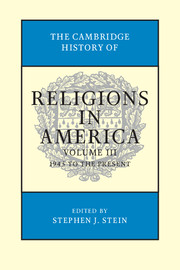Book contents
- Frontmatter
- SECTION I THE POSTWAR RELIGIOUS WORLD, 1945 AND FOLLOWING
- SECTION II CONTROVERSIAL ISSUES IN TRANSITIONAL TIMES
- 7 Secularization in American Society: A Review of the 1960s
- 8 Breaking Silence: Churches and Opposition to the Vietnam
- 9 The Religious Significance and Legacy of the Civil Rights Movement, 1950–1970
- 10 The Kennedy Election: The Church-State Question and Its Legacy
- 11 “Love is the Only Norm”: The New Morality and the Sexual Revolution
- 12 Second Vatican Council
- 13 The State of Israel
- SECTION III THE WORLD’s RELIGIONS IN AMERICA
- SECTION IV RELIGIOUS AND CULTURAL CONFLICT IN AMERICA
- SECTION V NEW AND CONTINUING RELIGIOUS REALITIES IN AMERICA
- SECTION VI CONCLUDING ESSAYS
- Index
- References
11 - “Love is the Only Norm”: The New Morality and the Sexual Revolution
from SECTION II - CONTROVERSIAL ISSUES IN TRANSITIONAL TIMES
Published online by Cambridge University Press: 28 July 2012
- Frontmatter
- SECTION I THE POSTWAR RELIGIOUS WORLD, 1945 AND FOLLOWING
- SECTION II CONTROVERSIAL ISSUES IN TRANSITIONAL TIMES
- 7 Secularization in American Society: A Review of the 1960s
- 8 Breaking Silence: Churches and Opposition to the Vietnam
- 9 The Religious Significance and Legacy of the Civil Rights Movement, 1950–1970
- 10 The Kennedy Election: The Church-State Question and Its Legacy
- 11 “Love is the Only Norm”: The New Morality and the Sexual Revolution
- 12 Second Vatican Council
- 13 The State of Israel
- SECTION III THE WORLD’s RELIGIONS IN AMERICA
- SECTION IV RELIGIOUS AND CULTURAL CONFLICT IN AMERICA
- SECTION V NEW AND CONTINUING RELIGIOUS REALITIES IN AMERICA
- SECTION VI CONCLUDING ESSAYS
- Index
- References
Summary
Richard Nixon, his reputation durably seared by the Watergate scandal, is certainly not remembered today as a paragon of presidential ethics. However, before the 1974 release of recordings that confirmed his complicity in illegal political conspiracies, Nixon had carefully cultivated a very different reputation. His campaigns for the presidency deliberately courted support from religious voters, and the endorsement of evangelist Billy Graham, who publicly commended Nixon as “a man with deep religious commitment,” symbolized and solidified Nixon’s appeal to Christian Evangelicals. Graham’s support also supplied a juicy subplot to the morality play staged in American media in response to the Watergate scandal. Reporters were quick to inquire into Nixon’s apparent betrayal of the personal friendship and political support of the spiritual leader. Time magazine reported that Watergate “posed a dilemma for Billy Graham, who is both a stern moralist and a friend of Richard Nixon’s.” Graham, the article stated, had released a “curious apologia” for the president, which read in part, “A nation confused for years by the teaching of situational ethics now finds itself dismayed by those in Government who apparently practiced it.” The remark avoided assigning direct blame to Nixon and identified instead a larger problem. “Situational ethics,” which Graham saw as a morally corrosive relativism, had so thoroughly permeated American culture that even the nation’s leaders were vulnerable to its influence.
- Type
- Chapter
- Information
- The Cambridge History of Religions in America , pp. 224 - 242Publisher: Cambridge University PressPrint publication year: 2009
References
- 1
- Cited by

